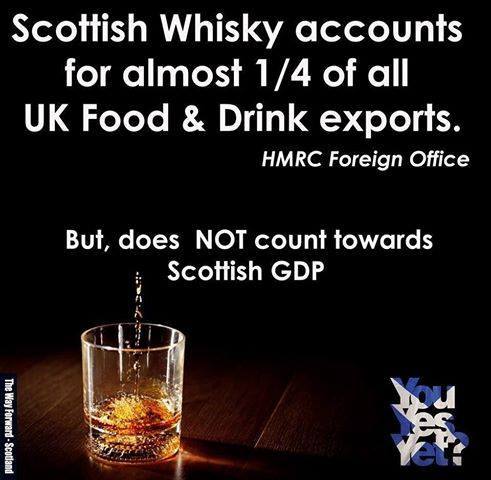dictionary definition: meme (noun)
1. an element of a culture or system of behaviour passed from one individual to another by imitation or other non-genetic means.
2. an image, video, piece of text, etc., typically humorous in nature, that is copied and spread rapidly by Internet users, often with slight variations.
Or this from Wikipedia:
A meme acts as a unit for carrying cultural ideas, symbols, or practices, that can be transmitted from one mind to another through writing, speech, gestures, rituals, or other imitable phenomena with a mimicked theme. Supporters of the concept regard memes as cultural analogues to genes in that they self-replicate, mutate, and respond to selective pressures.
I log into various Scottish Indy groups on Facebook. There are lots of ‘memes’ in these groups. Most of them are positive, often funny, sometimes inspiring. Here are a few taken from Yes Scotland’s Future.


- we Scots make one of the best, most appreciated, and sought after drinks in the world. No, not IrnBru. Whisky.
- it’s an iconic part of being Scottish
- it carries a great deal of cultural and social weight here. It’s what you offer your guests when they come through the door. It communicates values of friendship and trust.
- whisky is exported all over the world and to some extent it carries those Scottish cultural memes with it
As well as those cultural associations, whisky produces a lot of revenue from the various ways those exports are taxed. It will be a significant part of an independent Scotland’s GDP and revenue stream.
This is where things get muddy. HMRC does the sums about the UK’s trade. The UK’s trade. There is no Scottish HMRC which does the sums for Scottish trade. Instead what we have are a series of estimates made by HMRC. It can’t be an easy task because although Scotch is made in Scotland, it is exported from ports all over the UK. It’s probably often sold on to secondary firms elsewhere in UK who then arrange for its export from, say, Felixstowe or Liverpool. Add to this practical nightmare, it seems that in the past HMRC didn’t count anything as a Scottish export, or a Welsh export, unless it did leave through a Scottish or Welsh port. I’m saying ‘seems’ because I have no way of confirming that actually happened. But it is widely held to have happened. And more to the point, it is still held to be happening now.
The meme works because it plays into a sense that Scotland is treated unfairly by the current tax and financial arrangements. Something that we create and which has value to us is somehow lost to us. It doesn't count, literally. And it's not a big step from that to "we don't count".
Hence the the two statements on the poster. The first statement is true. But whatever export accounting system that HMRC may have used in the past, the second statement is definitely false.
I’m as much in favour as anyone else in this group to get accurate figures for Scottish economic activity. But this is just not true. Or I should say it’s mostly not true, and it’s all untrue as stated in the poster above. Please don’t share it.
If a Scottish company exports its product even if it goes via a port in rUk, then HMRC classes it as a Scottish export.
What does appear to be true is that if something is exported from a Scottish company to a separate company elsewhere in rUK and then that second company exports it from rUK, then that ‘second port of export’ won’t count towards Scottish export figures.
You don’t have to take my word for it, just google “HMRC Scottish exports” and you find this on the HMRC website:
Are Scottish goods which are exported via ports from the rest of the UK counted as international Scottish exports?
Yes. The ESS publication measures the destination of goods exported from Scotland regardless of the port from which they leave the UK.
How are Scotch Whisky exports treated?
All international exports relevant to Scotch Whisky are counted as Scottish exports, irrespective of the port at which they depart the UK. The data is sourced from the HMRC Overseas Trade Statistics report.
Scotch Whisky exports to the rest of the UK are estimated based on GCS responses, as HMRC do not collect information on trade within the UK[1].
How does ESS treat the situation where Scottish goods are initially exported to the rest of the UK, and subsequently re-exported?
The ESS estimates only capture the first point of export. This means if a good is exported to a company in the rest of the UK and that company then exports it somewhere else, ESS will only capture the export to the rest of the UK.
Direct sales from Scottish companies to international destinations are counted as international exports regardless of where they leave the UK.
